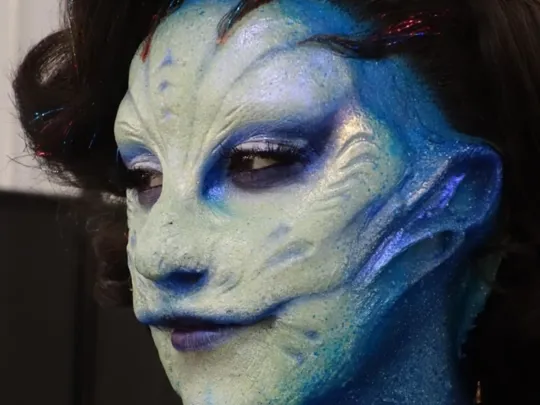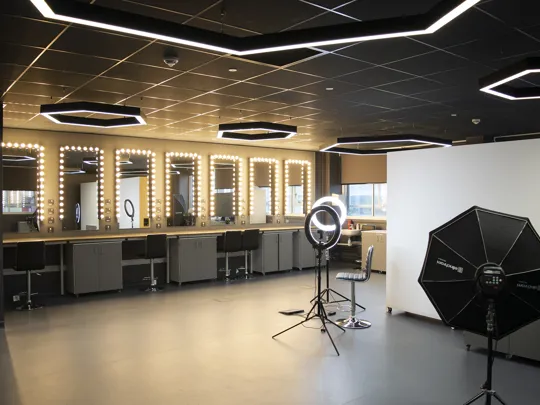of graduate employers say relevant experience is essential to getting a job with them
Why should I choose this course?
- EXPERT TEACHING – With a wealth of industry experience and knowledge, the teaching team are experts within their field and have created prosthetics for well-known productions
- INDUSTRY LINKS – Our strong industry links provide you with opportunities to undertake invaluable work placements and engage in guest speaker events so you have real insight into career prospects
- PRACTICAL APPLICATION – Develop your technical skill set while working within our cutting-edge, purpose-built prosthetics studios on campus
- DIVERSE CAREER OPPORTUNITIES – Studying this degree course will open doors to a wide range of graduate job roles, including those within traditional prosthetics production and digital design. These include artwork technician, prosthetics technician, 3D printing engineer and many more
- AWARD-WINNING UNIVERSITY – Study at the highest-ranking university in the region according to student choice (Whatuni Student Choice Awards 2023)
Our facilities
Our prosthetics courses provide a balance of theory, digital and practical training. You will have the opportunity to develop a range of skills on campus in our specialist, purpose-built facilities.
Course breakdown
Students on the FdA have the option of progressing onto the final year upon completion of the foundation degree.
- Year 1
- Year 2
- Year 3
Core Modules
Visual Culture and Context
This module underpins knowledge and understanding of industry developments to contextualise and inform your own practices. You will learn about key historical, cultural and technical developments, practices and movements related to the history of prosthetics design for screen and stage since 1900 to the present day. Contemporary practices will also be studied such as digital design and the implementation of AI to enhance creative applications.
Character Illustration and Design
In this module, you will be introduced to creating characters and conceptualising ideas for a specific cinematic genre and will learn the most appropriate characterisation techniques to develop interpretation of a character based on literary descriptions. You will learn how to break down scripts and be introduced to digital illustration techniques using software such as Photoshop.
Realistic Sculpture
This module will introduce you to using sculpture techniques with focus on proportion and anatomy of humans and animals. You will study anatomy and learn how to work with different clays, tools and a range of reference materials to achieve realism in your sculptures. Textures will also be explored alongside the making of bespoke tools to achieve further realism.
Flatbed Moulding and Prosthetics Application Techniques
You will learn how to create high-quality flat moulds, which are essential for producing prosthetic appliances to fit a diverse and inclusive range of performers. You will be introduced to templating, sensible prosthetic edge placement to support seamless applications for High Definition technologies and a range of casting materials to achieve effective applications for a range of industrial settings and scenarios. You will learn basic prosthetic application skills including hygienic practice, how to apply bald caps and cover eyebrows to create a blank canvas to work on to create a diverse range of characters. Placement, security, blending and continuity strategies will be explored upon application of flat bed prosthetics. Colour theory and the use of highlight and shading techniques to create three dimensional illusions will also be explored, along with airbrushing techniques.
The Prosthetic Material Toolkit
This fundamental module is designed to provide you with in-depth knowledge and theoretical underpinning of a wide range of prosthetic materials and tools and their suitability for different prosthetic making applications. You will gain a deep knowledge of selecting and preparing prosthetic materials, as well as the compatibility of materials with other products. Health and safety aspects of professionally working with these specialist materials, along with the safe use and maintenance of tools such as airbrush and degassing equipment will also be included to ensure longevity and sustainability of important prosthetics kit.
Professional Image Construction
This module introduces you to the importance of professional presentation to meet employer and audience needs. This module will explore photographic and post-production techniques, enabling you to develop your own visual narrative in response to a brief. You will learn essential photography skills that will allow you to explore and apply image-making techniques to support the professional development of your prosthetics portfolio. You will be encouraged to develop technical understanding including camera control, studio lighting and post-production methods, with an introduction into working with Chroma Key screens. Editing, limitations and ethics will also be explored.
Core Modules
Mask Manufacture
You will build upon your design, sculpting and painting skills introduced at level 4 to develop a fully finished character in the form of a wearable mask. This module will introduce you into three-dimensional mould making and slip casting techniques, whilst also further developing skills in airbrushing. Efficient methods of manufacturing masks on large scale projects will be outlined, focusing on inclusivity, practicality and health and safety issues when making masks for crowds, stunts and theatrical productions.
Contoured Moulding and Casting Skills
You will be introduced into creating moulds and casting prosthetic pieces to fit performers with seamless precision. You will use traditional life casting techniques, squeeze moulds and injection moulds using current industry standard materials to create small bespoke prosthetic pieces. Selecting the correct materials and methods to support continuity and mould maintenance will be explored, along with casting techniques and strategies to increase quality outputs and reduce wastage to maximise business profit margins.
3D Digital Sculpting
ZBrush is a digital sculpting software widely recognised and used in the entertainment industry. This module builds upon the two-dimensional digital design skills learnt at level 4, and provides you with fundamental skills in three dimensional modelling and sculpting to effectively communicate character and creature concepts in industry. You will gain knowledge of how to use the ZBrush interface and tools effectively through a combination of theoretical lectures, practical workshops and project-based learning. Emphasis will be placed on industry-standard workflows, creative problem-solving and artistic expression.
Holistic Character Creation
Developing upon skills learnt in professional image construction at level 4, along with prosthetic design and manufacturing skills, you will design a prosthetic character to a set literary text and produce a holistic character which includes postiche and/or fur and hair additions. You will be introduced to hair knotting and hair punching techniques to achieve realism in your creations. Continuity issues when working with hair will be examined, along with how to maintain hairpieces during performances to ensure longevity and sustainability.
Collaborative Practice
This module emphasises collaborative skills and interdisciplinary knowledge essential in the prosthetics industry sectors such as theatre, film, television, events and simulations. Through hands-on workshops, industry simulations and teamwork-orientated projects, you will explore the creative, technical and collaborative aspects of prosthetic design and application. Emphasis will be placed on team working, leadership, effective communication and problem-solving skills, along with understanding diverse perspectives within a collaborative creative context.
Entrepreneurial Skills, Industry Research and Ethics
Through a combination of theoretical insights, case studies and research methodologies, you will develop a deep understanding of entrepreneurial mindsets, business modelling, marketing and management strategies. Financial management techniques including budgeting, financial forecasting and risk management will be explored, along with pitching and presentation skills. This module will navigate different workplace settings and cultures within the prosthetics industry and explore ethics, diversity and inclusion within the field. Entrepreneurial concepts and strategies will be examined which are necessary to thrive in a dynamic and competitive business landscape.
Core Modules
Sustainable and Resourceful Practice
This module will develop your critical understanding of professional, resourceful and sustainable practice within the prosthetics workplace. Building upon the entrepreneurial skills learnt at level 5, challenges, trends, strategies and opportunities of sustainability will be a primary focus and you will research and identify an existing issue within a prosthetics business and propose an innovative solution. You will learn to lead the way and rewire business models and methods of working for resilience, increasing profit margins and oversee a lower carbon transition.
The Hybrid Technician
This module will advance upon 3D digital design skills at level 5 and will explore the combination and integration of traditional practical techniques such as sculpting and moulding with digital tools such as 3D scanning and printing. Experimental and innovative practice will be demonstrated with emerging technologies such as AI to enhance creativity and precision in prosthetic technical processes.
Hyper-Realistic Simulation
As technology advances, the demand for hyper-realistic prosthetic technicians in the events and entertainment industries continues to rise. This advanced module combines the foundation skills developed in realistic sculpting, colouring, life casting and moulding techniques and builds upon them to design and manufacture a hyper-realistic simulation piece suitable for film, television, theatre, museums, training simulation events and even virtual reality productions. You will be presented with an industry scenario and demonstrate high attention to detail and precision in practical skills to meet the requirements of a challenging brief.
Professional Creative Showcase
This module aims to develop your experience in events management through investigative research of creative events and event personnel. You will display both portfolio work and a live installation piece creatively to an audience, building entrepreneurial skills and giving you an individual artistic presence. This module aims to develop communication, organisation and management skills through partaking in collaborative practice, as well as develop the professional identity of each student through the organisation of an individual exhibit. The final exhibit will be a culmination of your three years of study and will demonstrate your achievement and professional practice. In addition to the individual exhibit, you will manage the creation of the showcase event, working collaboratively and professionally utilising preparation, organisation and communication skills. You will develop knowledge and understanding of key principles of curating an event from concept to completion developing management style, negotiation skills, self-motivation, organisation and appraisal.
Final Major Prosthetics Project
The Final Major Prosthetics Project (FMPP) module is a self- directed project, which requires you to define your own topic that builds upon the strengths of your previous work to achieve an outcome to increase employment opportunities within the industry. You are required to produce a body of work, clearly documenting their progress, project management, experimental practice and decision making. You will produce blogs that demonstrate self-reflection, analysis, evaluation and references to pertinent other designers, technicians and companies to ensure alignment with current industry requirements and contemporary trends.
The modules listed above for this course are regularly reviewed to ensure they are up to date and informed by industry as well as the latest teaching methods. On occasion, we may need to make unexpected changes to modules – if this occurs, we will contact all offer holders as soon as possible.
Entry requirements
Prosthetics for Screen and Stage BA (Hons)
A-levels: an A-level grade profile of CCC, Including a C in Art and Design.
T-levels: a T-level graded pass in a related subject with a core component of grade C.
BTEC: a BTEC grade profile of MMM in a related subject area. This can be achieved from either an Extended Diploma or a combination of smaller BTEC qualifications.
Tariff: other Level 3 qualifications are accepted for entry. A minimum of 96 UCAS Tariff points will be required.
Access to Higher Education Diploma: 96 UCAS Tariff points including a minimum of 15 Level 3 credits at distinction in a related subject area.
Additional requirements
GCSEs: GCSE/IGCSE maths grades 9-4/A*-C or equivalent
Please note: To access this programme you are required to have studied a related subject area. This can include art or theatrical programmes. If you have not studied a related subject, you may still be considered however you must attend an interview so that we can assess your previous experience in relation to the course content. If you are unsure, please contact Chelsey Mallett (c.mallett@ucb.ac.uk), head of department for Creative Industries.
Prosthetics for Screen and Stage FdA
A-levels: An A-level grade profile of DD, including a D in Art and Design.
T-levels: A T-level graded Pass in a related subject with a core component profile less than C.
BTEC: A BTEC grade profile of PPP in a related subject area. This can be achieved from either an extended diploma or a combination of smaller BTEC qualifications.
Advanced Apprenticeship (Level 3) in a related subject area.
Access to Higher Education Diploma: 48 UCAS Tariff points in a related subject area.
Tariff: Other Level 3 qualifications are accepted for entry. A minimum of 48 UCAS Tariff points will be required.
Non-tariff: Non-UCAS Tariff-based Level 3 qualifications are also considered for entry. Please complete our enquiry form to check your eligibility.
Additional requirements
GCSEs: GCSE/IGCSE maths grades 9-4/A*-C or equivalent
Please note: To access this programme you are required to have studied a related subject area, this can include art or theatrical programmes. If you have not studied a related subject, you may still be considered, however you must attend an interview so that we can assess your previous experience in relation to the course content. If you are unsure, please contact Chelsey Mallett (c.mallett@ucb.ac.uk) as head of department for Creative Industries.
Work-based: We also give equal consideration to applicants who are currently in work and wish to apply to University College Birmingham. To apply, you must have a minimum of 3 years’ relevant work experience, demonstrating management or supervisory duties. Your application must also include a reference from your line manager supporting your entry to higher education. For further details, please contact admissions.
International students
For academic and English entry requirements for EU and international students, please visit the Country Specific Information page.
Please note: As an International Student, when choosing optional placement, a visa extension may be required.
Key information
Teaching and assessment
Teaching
The programme will be delivered using a variety of methods including theory lectures, demonstrations, practical activities and reflective learning. You will have the opportunity to interact with guest speakers and leading specialists from industry to develop knowledge and enhance your technical skillset. Independent reading and research will be engaged with to ensure an interactive and personalised learning experience.
You will be assessed by a range of methods to encourage the development of a portfolio of work showcasing technical and transferrable skills. These will include, but will not be limited to reflective journals, reports, practical skills exhibitions, collaborative projects, sculpture, 2D and 3D digital designs and case studies.
Example of a typical teaching week:
- Small group teaching – 8 – 10 hours
- Large group teaching – 3 - 4 hours
- Tutorials – 1 – 2 hours
You will also need to commit around 20 hours per week for individual study time.
Assessment
Estimated breakdown of assessment for this course:
- Coursework – 70%
- Practical assessment – 20%
- Written exams - 10%
The demonstration of practical ability will be assessed through a range of coursework and practical assessment methods.
Our teaching and assessment is underpinned by our Teaching, Learning and Assessment Strategy 2021-2024.
Timetable
We understand that you need to balance study with work, so wherever possible lessons will be timetabled into 2-3 days a week, although you may wish to attend independent workshops across the week.
Tuition fees for home students
If you are a home student enrolling on a bachelor's or foundation degree course at University College Birmingham, the 2024/2025 academic year tuition fee for full-time study is £9,250. For part-time study, the fee is £4,625.
In 2025/2026, the full-time fee will be £9,535 per year, while the part-time fee will be £4,767.50 per year.
Tuition fees for international students
If you are an international student (or have been fee assessed as an international fee payer) and are enrolling on a full-time bachelor's degree course in 2024/2025, the fee for the academic year will be £14,000. If you complete a placement year, there will be an administration fee of £500 for a full year or £250 for a half-year placement.
In 2025/26, the tuition fee for the [Band 1] course will be £16,000 per year.
Uniform and kit costs
This course requires a uniform and kit costing approximately £500, depending on the items you purchase. (Prices are subject to change each year – exact costs and information on how to order required items will be provided to you prior to enrolment.)
Kick-Start Scheme
As a new student studying this course full-time, you will receive £300 per year through our Kick-Start Scheme (UK students only, eligibility criteria applies). This scheme will support your studies and future career by contributing to course-related materials, uniform or selected items on campus. You may also qualify for an additional £500 per year.
Find out more about the Kick-Start Scheme here.
Unibuddy Community - meet other students on your course
Starting university is an exciting time, but we understand that it can sometimes feel a little daunting. To support you, you will be invited to join our Unibuddy Community, where you can meet other students who have applied for the same course at University College Birmingham, before you start studying here.
As soon as you have been made an offer, you will be sent an invitation email to complete your registration and join the Unibuddy Community. For more information, check out our Unibuddy Community page.

Have questions around your chosen subject or course content? Are you wondering what you can expect to study as part of your course? Fill out our form and chat to a lecturer.
Work placements
Work placements are vital for gaining real-life experience and building your confidence and skills before you finish your course and may even lead to a job when you graduate. Our Hired team can help you find the ideal placement for you.
The Prosthetics for Screen and Stage degree features voluntary work placements for you to engage with industry, develop networking skills and enhance your career prospects. These are often short-term and may require travel, so it will be crucial to prepare for this. Throughout the academic journey, our collaboration with employers ensures meaningful connections are formed, enhancing the overall learning experience and laying the foundations for a successful career in the world of prosthetics.

"The FdA/BA (Hons) Prosthetics for Screen and Stage degree programme offers hands-on skills, industry insights and the power to engage audiences, opening doors to a diverse career in film, TV, theatre and other sectors within the entertainment industry."
Career opportunities
The example roles and salaries below are intended as a guide only.
Prosthetics technician
Variable
Artwork technician
Average Salary: £28,500
3D printing engineer
Average Salary: £38,468
Prosthetics consultant
Average Salary: £40,000
Want to take your studies to the next level? Completing the BA (Hons) degree will enable you to move onto postgraduate courses such as our Prosthetics for Film and Television MA.

Learn the latest techniques in character and creature prosthetics design and application through our meticulously crafted curriculum, seamlessly blending digital technology with traditional skills to build a standout portfolio.
Above: Prosthetics student Cian takes centre stage with character creation at a prosthetics industry event.
Meet your lecturers














